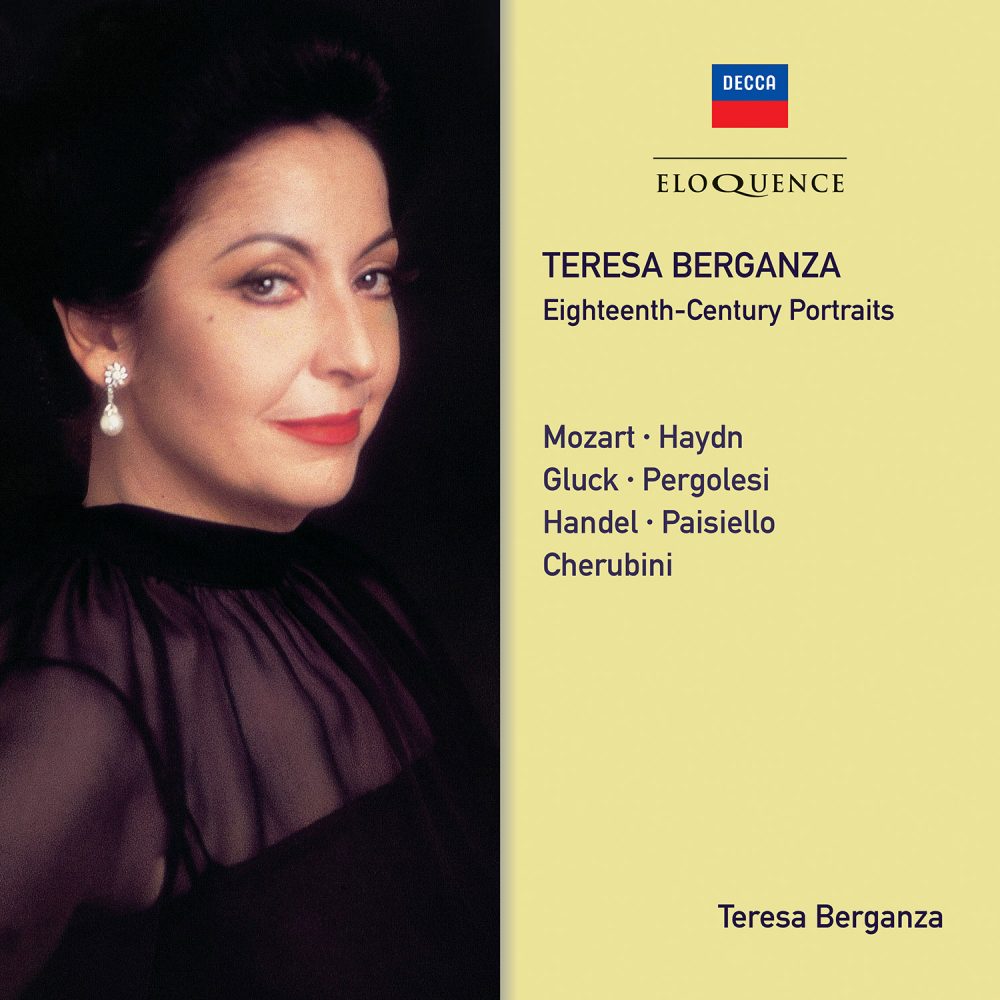To complement a 2CD set of Rossini and Spanish songs entitled ‘Brava Berganza’ (482 6397), Eloquence has also reissued more buried treasure from the Decca discography of Teresa Berganza. The compilation takes its title from a 1961 album made, like the Rossini arias on ‘Brava Berganza’ with Sir Alexander Gibson conducting the orchestra of the Royal Opera House, Covent Garden where the mezzo-soprano had made a sensational debut the previous year as Rosina in ‘Il barbiere di Siviglia’.
These portraits are of both heroines and trouser-role heroes, including Gluck’s ‘Orfeo’ and Cherubini’s ‘Medea’ as well as arias from an earlier generation by Pergolesi and Handel. In all of them there may be appreciated her captivating stage presence and a wide-eyed, coltish eagerness of characterisation. Back in London’s Kingsway Hall in 1962, she set down seven Mozart arias with the supple accompaniment of John Pritchard and graced with sensitive obbligato contributions from Gervase de Peyer (in ‘Parto, parto’ from ‘La clemenza di Tito‘) and Geoffrey Parsons in the concert-aria ‘Ch’io mi scordi di te‘. She encompasses with equal success the impetuous ardour of the priapic page in ‘Figaro’ and the contrasting sisters in’ Così fan tutte’.
Almost twenty years later, Berganza recorded more concert arias with undimmed eloquence, intensity and impeccable Mozartian style. The collection is completed by Haydn’s tragic cantata ‘Arianna a Naxos’, partnered at the piano in 1977 by her husband and long-standing accompanist, Félix Lavilla. Though the interpretation had to wait until 1986 for a first issue, it is distinguished by a classical nobility of style as well as the dramatically lived feeling for text and for the heroine’s predicament that made Berganza ‘the Carmen of the century’ according to no less than Herbert von Karajan.
CD 1
WOLFGANG AMADEUS MOZART
Le nozze di Figaro, KV 492:
Non so più cosa son, cosa faccio
Voi che sapete
La clemenza di Tito, KV 621:
Parto, ma tu ben mio
Così fan tutte, KV 588:
Temerari! Sortite! … Come scoglio!
E amore un ladroncello
Ei parte … Per pietà
Ch’io mi scordi di te, KV 505
London Symphony Orchestra
John Pritchard
Ombra felice … Io te lascio, KV 255
Misero me … Misero pargoletto, KV 77
Giunse alfin il momento … Al desio, di chi t’adora, KV 577
Se ardire, e speranza, KV 82
Conservatevi fedele, KV 23
Wiener Kammerorchester
György Fischer
CD 2
CHRISTOPH WILLIBALD GLUCK
Orfeo ed Euridice:
Che farò senza Euridice?
Che puro ciel, che chiaro sol
Alceste: Divinités du Styx
Paride ed Elena: O del mio dolce ardor
GIOVANNI BATTISTA PERGOLESI
La Serva Padrona: Stizzoso, mio Stizzoso
GEORGE FRIDERIC HANDEL
Giulio Cesare: Piangerò la sorte mia
GIOVANNI PAISIELLO
Nina, o sia la Pazza per Amore: Il mio ben quando verrà
LUIGI CHERUBINI
Medea: Medea! O Medea! … Solo un pianto
Orchestra of the Royal Opera House, Covent Garden
Alexander Gibson
FRANZ JOSEPH HAYDN
Arianna a Naxos – Cantata, Hob.XXVIb:2
Félix Lavilla, piano
Teresa Berganza, mezzo-soprano
Recording Producers: Christopher Raeburn (Mozart, Haydn); Michael Bremner (Gluck, Pergolesi, Handel, Paisiello, Cherubini)
Balance Engineers: Kenneth Wilkinson, Michael Mailes (Mozart/Pritchard); James Lock, Simon Eadon (Mozart/Fischer); Alan Abel, Cyril Windebank (Gluck, Pergolesi, Handel, Paisiello, Cherubini); James Lock (Haydn)
Recording Locations: Kingsway Hall, London, UK, 15, 18, 20 & 21 December 1962 (Mozart/Pritchard), 8–11 June 1960 (Gluck, Pergolesi, Handel, Paisiello, Cherubini); Sofiensaal, Vienna, Austria, 26–27 May 1977 (Haydn), 3–9 January 1981 (Mozart/Fischer)
Remastering Engineer: Chris Bernauer
Original Decca LP Releases: SXL 6045 (Mozart/Pritchard); OS 26663 (Mozart/Fischer); SXL 2251 (‘Arias of the 18th Century’: Gluck, Pergolesi, Handel, Paisiello, Cherubini); 414 612-1 (Haydn)
‘The Berganza voice […] is surely one of the loveliest and most flexible to come along since the war. Here she gives evidence of a very firm grip on classical style … ‘O del mio dolce ardor’ […] is spun forth with great tranquillity: the vocal texture, the relaxed but never slack attack, are exactly right.’ High Fidelity (Eighteenth-century Portraits)
‘In Berganza’s work there are no stylistic mannerisms. She tears into the music like a violinist launching a cadenza, and her extraordinary gifts make it all the more natural sounding, giving her temperament its extroverted way… Cherubino’s songs are done to a turn.’ High Fidelity (Mozart Arias)
‘This has always been one of Teresa Berganza’s most attractive records.’ Opera (Mozart arias)




